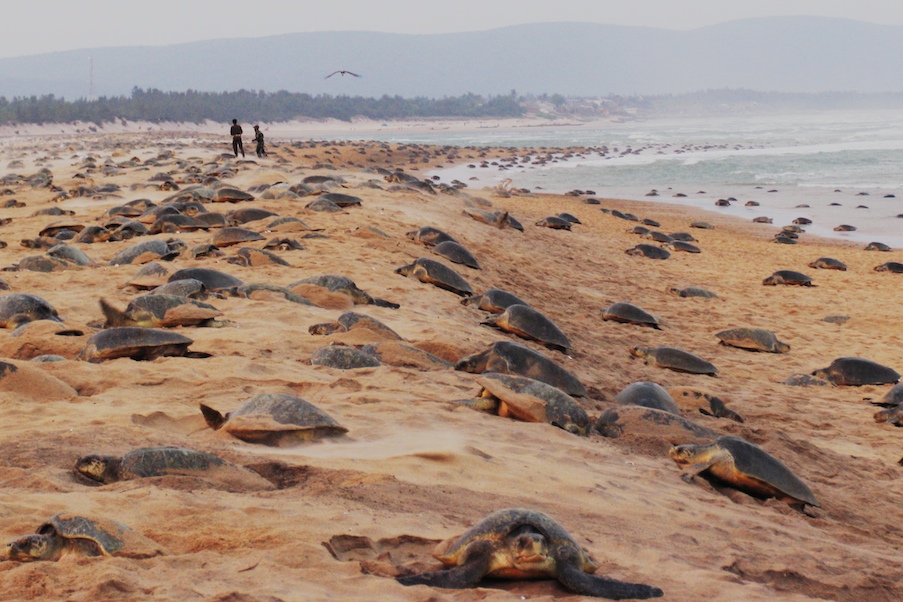
“The wind has shifted; it’s coming from the south now,” was the February 28 message from Muralidharan M., a researcher working on olive ridley sea turtles in the state of Orissa. His tentative conclusion: “the arribada could begin.” Rooted in Spanish, adopted by all, arribada means arrival— or in this case, arrival of olive ridley sea turtles from the ocean, en masse. Sure enough, thousands of sea turtles surfaced from the Bay of Bengal waters that same evening. The congregation continued arriving, nesting and departing until about 8 the following morning.
The arribada usually lasts for 2-3 days. Last year (2011) was exceptional, with over a hundred thousand turtles migrating in to nest on beaches over the course of some 10 days. But there are no guarantees. The year 2007 featured no significant arribada.
Within hours we were on a flight to Bhubaneshwar, the capital city of Orissa, then bound by car for the coastal area where Rushikuliya River enters the ocean. Luckily, thousands more arrived on the night of February 29.
The moonlight was cloud-covered, dim. Standing on shore, I watched fifteen turtles—no, sixteen— shiny dark buoys gliding in with the crashing onrush of waves. Two others bobbed up, and more. Their mass was like a slow river of intention flowing inward where the river waters flow out to sea. A throng of sandy-shelled turtles headed back, their nesting efforts completed. Carapace collided with carapace and two females shifted course. Crawling up beyond the level of high tide, the incoming turtles went to work.
The efforts seemed communal enough, yet they were barely aware of each other. One clambered over another as she laid her eggs in a carefully shaped urn-in-the-earth. Sand covered the trampled female, who continued unphased. A few feet away, a turtle kicked up the eggs from a previously dug nest. Her flippers worked like spatulas, scooping compressed sand turn by turn, shaping her own nest. An egg flew onto her back. Squashed yolk glowed dully in the moonlight, heralding the end of a life.
How is the arribada an advantage to olive ridleys? “Such numbers work to saturate the beach with eggs,” Murali explained. “It swamps the predators. Many eggs will be taken, but a lot of them will survive.” He works for Kartik Shanker at the Indian Institute of Science, and has trained several local community members in sea turtle monitoring.
Gradually, dawn pinked the landscape full of dark shells. Mass nesting continued the single-minded sense of purpose driven by an internal ebb and flow of hormones— a gathering that is still only partly understood by science, partly a mystery.
This post first appeared in the Turtle Diaries project blog. The Turtle Diaries project is aimed at educating the public about the four species of sea turtles that breed in India’s coastal habitats, and facilitating dialogue between scientists and local community-based conservation groups through the effective use of media tools.

 CI is a non-profit, non-commercial portal that aims to facilitate wildlife and nature conservation by providing reliable information and the tools needed to campaign effectively.
CI is a non-profit, non-commercial portal that aims to facilitate wildlife and nature conservation by providing reliable information and the tools needed to campaign effectively.
Chosen as 'Picture of the Week'
Arribada means arrival. In this case, arrival of thousands of olive ridley sea turtles from the ocean, en masse -- to nest and depart.